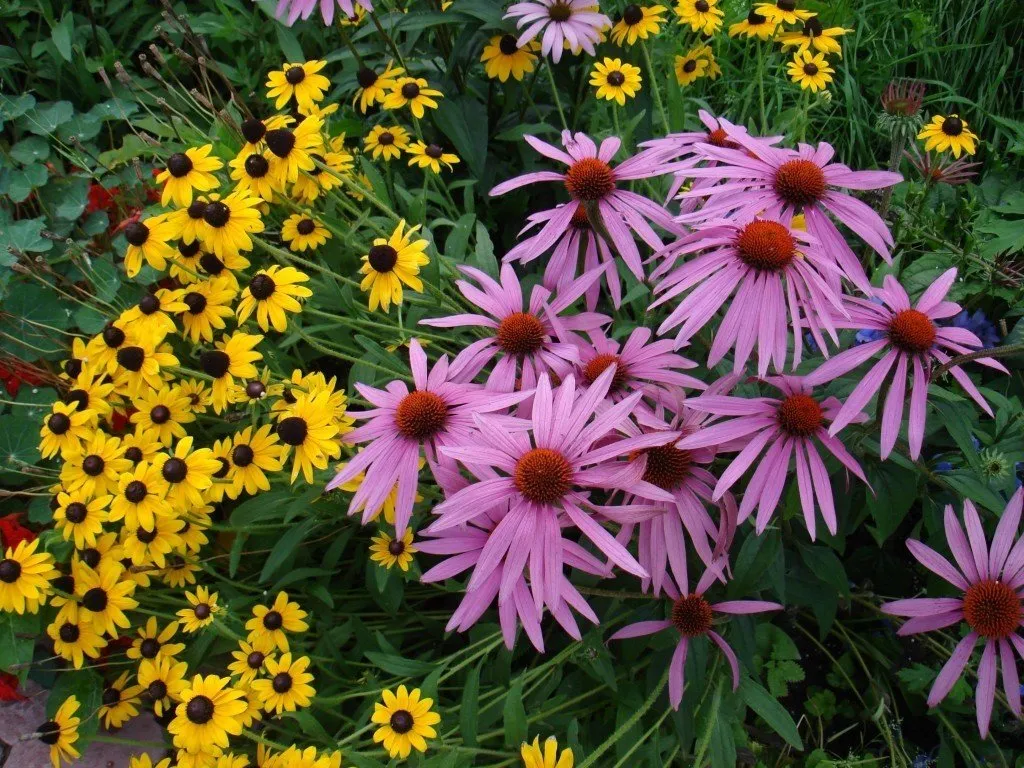There can be your advertisement
300x150
30+ Flowers You Can Plant in March
To enjoy a vibrant and fragrant garden on your plot, it's time to start planting flowers now
March is an excellent month for preparing a summer flower bed. We've selected various plant options that can sprout on your dacha in just a few months.
Echinacea
Pink, yellow, raspberry, and white petals of echinacea are a true magnet for bees and butterflies. If you plant these flowers in your garden, it will definitely come alive with new colors.
However, its blooming period falls in mid-July, about a year after planting. It's important to sow the seedlings before the 20th of March, so you still have time.

Lobularia (Annual Alyssum)
You can observe this plant on urban flower beds — it grows as a dense and beautiful carpet. Lobularia includes over 100 subspecies and is sown from mid-March to early April.
To ensure seeds germinate, they should be lightly dusted with moist soil — sprouts will appear in 10–12 days. The optimal time for transplanting into the ground is the end of May.

Verbena
A low-maintenance and elegant flower to admire until the first frosts.
However, do not delay with seedlings — seeds should be sown before March 20th, after soaking them in a growth stimulator. It's important to remember that seedlings should not be covered with soil during sowing.
Verbena will sprout in 15–20 days, and it can be transplanted into the ground in the second half of May.

Clematis
This flower is named after its climbing vine, which can reach up to five meters in height. It's best to sow clematis seeds before the end of March — and they will bloom actively in summer.

Iberis
Fragrant Iberis often decorates alpine hills. The plant exists in five forms: bitter, umbrella-shaped, feathery, evergreen, and gibralter.
Blooming begins in May-June, so there's no rush to start seedlings: sow seeds until April, and plant them in sunlit areas in May.

Cleome
Blooming actively from June until frost, cleome will make your garden unique and attract hundreds of bees.
Seeds should be sown at a depth of 1.5 cm, and once they sprout, transplant them into pots. It's best to move the plant to the garden in the second half of May. Flowers should be spaced 50 cm apart.

Cobaea
This climbing plant blooms until October and is perfect for greening balconies or gazebos.
Planting cobaea should be done before the 20th of March, pre-soaking the seeds in a growth stimulator. Transplanting to lawn or soil is allowed in early June — the flower doesn't tolerate spring frosts well.

Bluebells
Bluebells come in over 300 varieties — some are two-meter giants, others just five centimeters tall. In our country, only 13 species of these flowers can be found.
Seeds should be sown on the surface without covering with soil. Sprouts can be expected in about a week.

Annual Sweet William
Abundantly and long-blooming sweet william has undeniable advantages over its relatives: it is drought-tolerant and can sprout between stones.
To germinate, seeds need three months, so start sowing in March.

Brachiea Iberidiformis
A very hardy flower that can be sown until the 20th of March. Seeds only need to be gently pressed into the soil.
Transplant brachiea into hanging baskets or pots in late May.

Lion's Mouth
Previously, lion's mouth could be seen on every plot, but today its popularity is not as high. It's a pity — because the flowers look magnificent due to their conical shape.
Seeds should be sown until the end of March in loose soil with added sand. Do not overwater the seedlings, and it's better to plant sprouts in the garden in mid-May — lion's mouth tolerates cold well.

Annual Phlox
In Russia, phlox is sown via seedlings until the end of March, and the first sprouts appear in 5–8 days.
As soon as the leaves appear, you can begin fertilizing the flower (twice per season).

Levisticum
You can plant levisticum from mid-February to March 20th. Seeds should be dusted with river sand and moistened with a spray bottle. Immediately after sprouting, move the seedlings to a cool place to prevent plant death.

February Flowers
Plants you couldn't plant in February can be sown in March. For example, heliotrope, lavender, and lobelia will bloom beautifully in July.

All Photos: Pinterest
Besides the above-mentioned, you can also sow the following flowers in March:
- Sea Aster (Amphiastrum maritimum);
- Forget-me-not (Myosotis);
- Verbena (Vernonia);
- Dichondra;
- Silver Leaf (Eryngium);
- Decorative Cabbage;
- Osteospermum;
- Sweet Woodruff (Galium odoratum);
- Sea Aster (Chrysanthemum maritimum);
- Echium;
- Ageratum;
- Annual Chrysanthemums;
- Arctotis;
- Annual Baby's Eyes (Fumaria);
- Gazania;
- Helichrysum;
- Sweet Pea (Lathyrus odoratus);
- Common Tobacco (Nicotiana);
- Penstemon;
- Salvia;
- Celosia.
More articles:
 How to Organize a Wardrobe in a Small Apartment: 6 Great Examples
How to Organize a Wardrobe in a Small Apartment: 6 Great Examples 10 Pro Tips for Adding Gloss to a Faded Interior
10 Pro Tips for Adding Gloss to a Faded Interior How to Transform a 23 m² Studio: Tips from a Homestager
How to Transform a 23 m² Studio: Tips from a Homestager Where to Find Space for a Closet in a Standard Apartment: 6 Ideas from an Expert
Where to Find Space for a Closet in a Standard Apartment: 6 Ideas from an Expert How to Use the Space Near the Kitchen Window: 7 Ideas from Professionals
How to Use the Space Near the Kitchen Window: 7 Ideas from Professionals How to Transform an Old Khрущëvka on a Budget: Tips from a Decorator
How to Transform an Old Khрущëvka on a Budget: Tips from a Decorator 10 Important Steps of Bathroom Renovation: An Invaluable Guide from a Master
10 Important Steps of Bathroom Renovation: An Invaluable Guide from a Master Cool Accent: 10 Modern Interior Items from Spain
Cool Accent: 10 Modern Interior Items from Spain